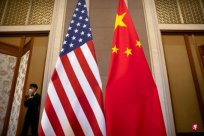In retrospect, on the afternoon of April 4th, Yellen flew to Guangzhou, across a canvas bag, and carried a brigade bag to get off the plane. A simple dress caused heated discussion in Chinese social media.Some netizens lamented that she was like an old lady next door.
Subsequently, the Chinese media exposed the first meal after Yellen's visit to China -the menu for Tao Taoju in Guangzhou.A century -old brand that ordinary people often patronized in this Chinese ordinary people ordered Cantonese snacks such as prawns dumplings, red rice intestines, radish cakes, double -skinned milk, century -old roasted goose, iced Guru meat, and Cantonese cuisine.
It is reported that Yellen did not enter the box, but dine in the lobby. The accompanying staff also asked the restaurant to open the obscure screen.CCTV's "Yuyuan Tan Tian" Weibo described that Yellen used chopsticks and "used well."
After Yellen arrived in Beijing, the Chinese media also reported that the group went straight to Laochuan to run a restaurant and ate classic Sichuan cuisine and other classic Sichuan cuisine such as Mapo Tofu, Zhong Dumplings, Noodles, and Boat meat.
The Chinese believe that the people take food as the sky. Although Yellen's visit to China, with the task of pressureing Beijing on Beijing and the United States, the Chinese media report on Yellen's keen on Chinese food., Faded the smell of gunpowder and raised the people's favor to her.Some network "Big V" believes that Yellen's love for Chinese cuisine shows the tolerance of multiculturalism and is also respect for the host culture.
Yellen ended on April 9th .An interview with Wang Wen, Executive Dean of Renmin University of China Chongyang Financial Research Institute.Wang Wen commented that the Chinese media's report on Yellen's visit to China was a good public opinion debugging attempt, and called for "a slight adjustment of public opinion environment for negative reports to the United States for a long time."
Wang Wen bluntly stated that since the financial crisis in 2008, it tells topics such as the weakness of the United States, political internal fighting, economic risks, racial contradictions, flooding of guns, foreign hegemony, inciting war, overflowing crisis, etc.Paragraphic; Introduce the level of advanced science and technology in the United States, telling the United States that the United States is still strong, calling on China to still learn from the United States to learn from the United States, and to promote Sino -US cooperation.
He believes that the critical discussion of the United States has played a very effective encouragement of morale, struggle, showing national strength, and singing light.
Wang Wen does not deny that there are still certain differences in negative public opinion reports and the real situation of US national strength, and warned that this "is encouraging some wrong trends in China", "this extreme paranoia and wrong thoughts are being transformed into transformation into transformation intoThe suppression of private investment, the "lying level" of social innovation, the lag of Chinese and foreign cooperation, and the stagnation of opening up to the outside world have become a new variable that severely suppress social expectations. "
He also believes that recognizing the advantages and innovation advantages of the United States, "will further promote the emancipation of the ideological liberation of Chinese society, help the implementation of a series of open policies, and suppress the proliferation of the" extreme left "trend, stimulate the dare to be good at right right.The ingenuity of the struggle of the beauty of the beauty and the relatively insufficient social contradictions of the smooth development allows the public to be more motivated to pursue a better life. "
Sino -US relations have deteriorated since Trump's administration, and the external environment faced by China is more complicated; after Bayeng's administration, the United States rebuilds the allies to increase the encirclement of China.In this environment, Chinese officials have emphasized that in the past few years, they have emphasized to struggle in diplomacy. The tough "wolf warfare" style has also become the main tone of domestic public opinion in China.
China's public opinion reports and attitudes to the United States often show a confrontation attitude.Scholars with familiar Chinese scholars privately revealed that when participating in the recording of official media, the guests were asked to push all the responsibilities of international issues involved in the theme to the United States.
This aspect has deepened the hostility of the Chinese folk to the United States and formed a strong trend of nationalist ideology. There are even hatred and paranoid.Time becomes passive.On the other hand, the aversion to the advantages of the United States may be in line with the discussion of "eastward and west", but it may also create irrational forgetfulness in Chinese society, and it may also strengthen public opinion that the people advocate active decoupling.From the perspective of third parties in the external world, Chinese public opinion is degraded to the United States and created negative emotions, not only to lose air, but also contrary to the open image of China to shape.
Adjust the appeal of US public opinion, I believe that relations with China and the United States in November The National Head Head of state San Francisco appropriately eased, and the color of China's foreign struggle is no longer so prominent.It is worth noting that the remarks thrown through the official platform this time are it the personal proposition of the scholars, or do you test or make a momentum on behalf of the upper level?
Speaking, degradation and hatred are not only China's public opinion environment for the United States, but also the mainstream attitude of American public opinion in China in recent years. Western media reports are also full of negative colors.EssenceThis kind of public opinion confrontation is the product of tight Sino -US relations. In turn, it is also developing in the direction of the dislike of relations between the two countries.Essence


